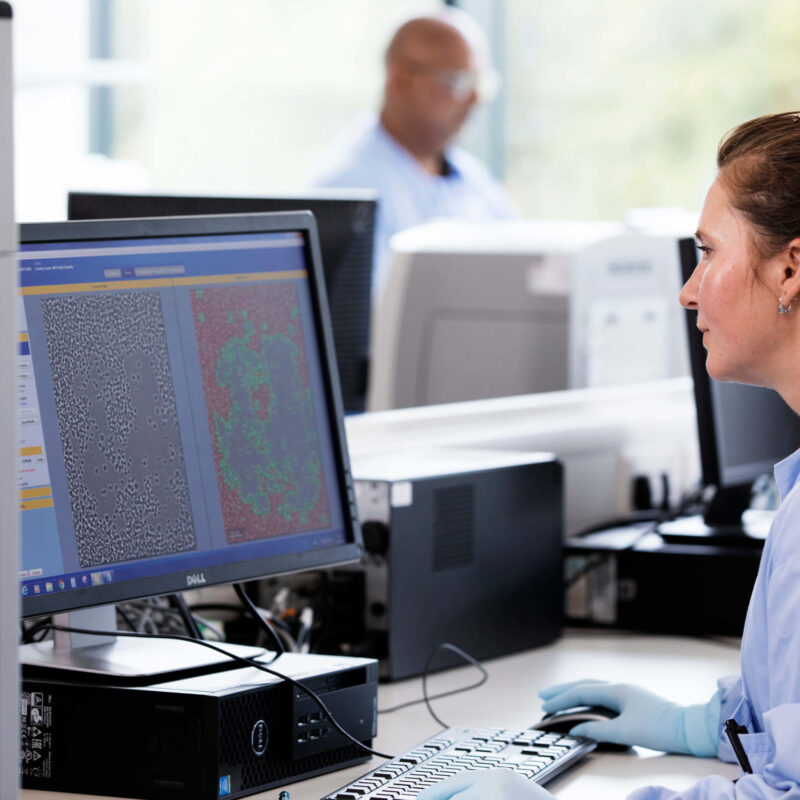Why Abzena?
Our focused approach.
Protein engineering has become a serious tool in the development of antibodies and other protein therapeutics. Considerations such as immunogenicity, half-life, post translational modifications, and format have all become critical to the development of therapeutic proteins.
For over 20 years Abzena has been providing antibody design and protein engineering services and solutions to accelerate biopharmaceutical development. Working together with our customers, we have overcome a wide range of drug design challenges. From antibody discovery through to cell line development we can engineer, express, purify and characterize your molecules. Utilizing experience from successfully delivering many hundreds of projects, our experts work relentlessly to meet your needs, enhance efficiency, and mitigate risk.

Abzena has a long and successful history of providing protein engineering solutions to accelerate biopharmaceutical development and overcome a wide range of challenges. Abzena’s portfolio of antibody and protein engineering services offers a range of standard and custom solutions, which include protein deimmunization and antibody humanization, broader developability of lead sequences and the removal of sequence liabilities, affinity maturation, bispecific design and formation as well as isotype reformatting.
We have developed a range of innovative antibody design and engineering solutions across a range of modalities.
Immunogenicity is always a potential concern for any new drug. Humanization and deimmunization is an essential part of the process for the development of therapeutic antibodies and proteins derived from non-human sources. Abzena’s proprietary platforms facilitate the design process by eliminating human T cell epitopes, significantly reducing potential immunogenicity and improving the safety profile of therapeutic candidates.
Abzena’s Composite Human Antibody™ (CHAb™) solution focuses specifically on the reduction of predicted immunogenicity hotspots across the sequence using iTope-AI, Abzena exclusive proprietary in-silico immunogenicity prediction tool, to identify MHC class II binding peptide sequences. Abzena’s humanization approach focuses on introducing substitutions from multiple human germlines to specifically reduce this predicted immunogenicity. Our Composite Human Antibody™ platform combines the best attributes of deimmunization and humanization techniques to minimize the immunogenic potential, whilst retaining the original function of the mAb.
Our Composite Proteins™ deimmunization technology builds on the success of antibody humanization to design safer therapeutic proteins, devoid of human T cell epitopes, to minimize potential immunogenicity in patients without compromising activity.
Protein engineering is not limited to ‘surgical’ sequence manipulation – the development of novel therapeutic antibody modalities, such as bispecific or multispecific antibodies can require engineering at the domain level to bring together different specificities. By using our experience in reformatting sequences, we can help you design, express and test bispecific candidates to get you to the right format quickly.
Manufacturability of an antibody is an important aspect of design that should be considered from the very earliest of stages. By combining in silico tools as well as biophysical characterization using state of the art analytics, we can identify potential sequence liabilities that may be present within a molecule. Once identified, we can design sequences that address these liabilities with the aim of improving the manufacturability profile of your molecule.
The Fc part of an antibody is more than just a scaffold for the variable domains. The Fc plays a critical role in the overall function of the antibody and is responsible for mediating immune effector functions and in vivo IgG stability. Abzena has significant experience in Fc engineering to modulate the function of an antibody through, e.g. either reducing or increasing effector function, or through modulating the half-life of a therapeutic.
Antigen binding affinity is one of the most critical properties of a therapeutic antibody, however, occasionally a candidate antibody may have a too low affinity to show the desired efficacy. In this situation we would apply affinity maturation utilizing our scFv-based phage-display platform to enhance binding affinity. By following a streamlined library design, selection and characterization process we are able to ensure high specificity and functionality of the resultant antibodies.
Engineering of any kind will, by its nature, change the physico-chemical properties of the molecule compared to the starting sequence. Sequence liabilities can include: isomerization, deamidation and glycosylation sites, as well as free cysteines and other motifs. These, in turn can affect the function of the antibody over time, be a potential safety risk, or lead to manufacturing problems. Additionally, overall surface chemistry, such as hydrophobic patches can lead to poly-reactivity while charge distribution can affect pharmacokinetics (PK). By being aware and engineering out potential risks, you will smooth your developmental journey to the clinic.
By applying a range of stage-appropriate analyses we are able to rapidly select candidates that have the optimal properties for development and manufacturing.
Site-specific approaches towards conjugation are increasingly gaining traction due to the ability to generate homogeneous constructs with precise drug loading and predetermined sites of attachment. Of these site-specific approaches, several require engineering of a site-specific handle or tag into the sequence for efficient conjugation. At Abzena, we have significant experience of both engineering different site-specific motifs as well as of the conjugation itself, thereby allowing the exploration of a wide range of different conjugation approaches.

We deliver stage-appropriate antibody production packages tailored to your development needs, based around our CHO mammalian expression systems. All our proteins and antibodies undergo rigorous quality control which includes the assessment of purity and integrity. Extended analytics are also available to further evaluate the standard and novel characteristics of your biologic.
For specific projects, small-scale, research-grade bacterial expression is also available.